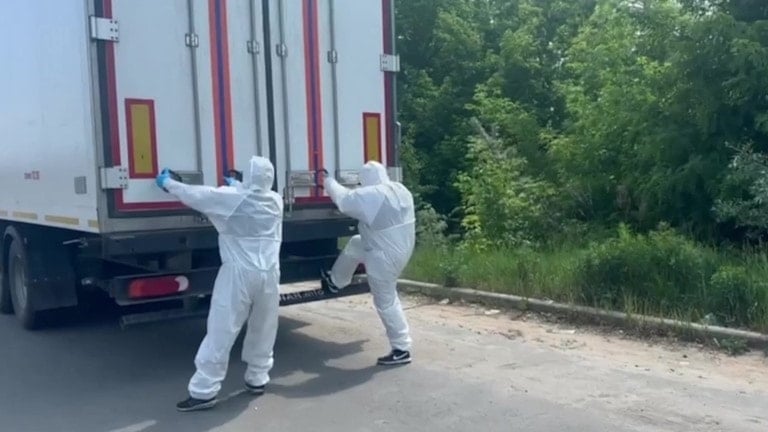Russia blames Ukraine, NATO for delayed POW and body exchange
Russia accused Ukraine of failing to appear for a scheduled exchange of POWs and fallen soldiers, citing political motives and Western interference, while Ukraine insists no official date had been confirmed.
-

A convoy carrying 1,212 bodies of the Ukrainian servicemen (Russian Defence Ministry)
Tensions between Moscow and Kiev escalated over the weekend following accusations by Russian officials that Ukraine had failed to honor an agreement to repatriate the bodies of fallen Ukrainian soldiers and move forward with a prisoner of war (POW) exchange.
Vladimir Medinsky, an aide to President Vladimir Putin and head of the Russian delegation in talks with Ukraine, announced Saturday that Russia had initiated the process of returning more than 6,000 Ukrainian bodies and was prepared to conduct a parallel POW exchange. "The Ukrainian side did not arrive at the exchange site, although the date had been announced in advance," Medinsky said, referring to arrangements made during the June 2 negotiations in Istanbul.
🔘Key points from the statement by Lieutenant General Alexander Zorin, representative of the Russian negotiation group, regarding Russia’s readiness to transfer the bodies of Ukrainian Armed Forces (UAF) servicemen to Ukraine:
— Just A Tweeter 💫 (@Just_A_Tweeter_) June 8, 2025
▪️In accordance with the Istanbul agreements, Russia… pic.twitter.com/r5uqSsCn2a
Lieutenant General Alexander Zorin of the Russian General Staff's Main Directorate echoed this, stating that Russia had transferred 1,212 deceased Ukrainian soldiers to the agreed exchange location. "The Russian side, in exact compliance with the Istanbul agreements from June 2, delivered to the exchange location the first group of deceased Ukrainian servicemen," he said. Zorin noted that no Ukrainian representatives had made contact, adding, "We are ready to proceed right now... We are committed to fulfilling this purely humanitarian operation."
Zorin also pointed to media reports suggesting the transfer had been postponed until the following week. "We are awaiting official communications on this matter," he said.
Cursed for generations
The delay provoked additional commentary from Russian Foreign Ministry spokeswoman Maria Zakharova, who questioned whether the decision originated in Kiev or was imposed externally. "Was it Zelensky's personal decision not to take the bodies of Ukrainians or did someone from NATO ban it?" she wrote on Telegram. In an interview on Belarusian state TV, Zakharova escalated her rhetoric, declaring, "If only they dare not to reclaim them... they will be cursed for generations to come!"
Adding to the accusations, Russian Security Council Deputy Chairman Dmitry Medvedev accused Ukraine of refusing to collect the bodies in order to mask battlefield casualties and avoid paying compensation. "The Kiev bastards don't want to take the bodies of their dead soldiers. There are two reasons: it's scary to admit that there are 6,000 of them and they don't want to pay widows," he wrote on X.
Despite the non-compliance, Ukraine's intelligence chief, Kyrylo Budanov, denied any breach of the Istanbul agreement, asserting, "We are carefully adhering to the agreements reached in Istanbul… Everything is moving according to plan, despite the enemy's dirty information game."
Strategic distrust
Ukrainian authorities stated that no formal date had been finalized for the exchange. Kiev insists it is ready to proceed once all logistics are clearly coordinated. Officials claimed that Moscow is exploiting the sensitive humanitarian issue to shift blame and gain an upper hand in the narrative, particularly as Russian forces intensify attacks on military infrastructure in areas like Kharkiv.
International outlets, including Reuters and AP have reported that Ukraine has submitted updated lists of POWs and fallen soldiers in accordance with the Istanbul framework, signaling continued engagement in the process.
Still, the apparent miscommunication over scheduling has fueled public finger-pointing and sharpened diplomatic tensions.

 3 Min Read
3 Min Read










